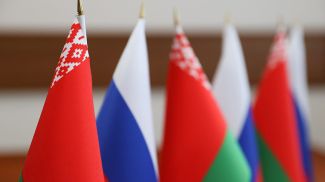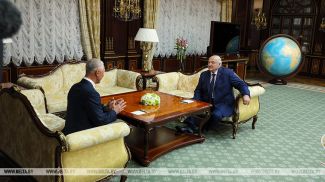MINSK, 10 April (BelTA) – The problem of understaffing in mass media was in the focus of the meeting between Belarus President Alexander Lukashenko and heads and journalists of the country's largest state-run mass media on 10 April, BelTA has learned.
Journalists of the Belarusian State TV and Radio Company talked about what they called a disturbing trend: the deficit of TV journalists, although relevant educational programs are available in Belarus.
Alexander Lukashenko stressed the need to select those people who will be in demand after graduation.
Journalism is a special job, he added. It is important for the Faculty of Journalism to enroll those who are into journalism and will be working in mass media after graduation. “Thos who have graduated from the university should be working in their major,” the head of state believes.
The president urged to solve the problem of understaffing in mass media. He also spoke in favor of the proposal brought forward by the TV journalists: to work at schools with those students who want to become journalists. The head of state compared journalism with the IT industry which has also been paying an increased attention to future specialists. It is important to spot talents among young people in the rural areas, Alexander Lukashenko underlined.
According to Head of the Belarus President Administration Natalya Kochanova, today there are about 1,200 students studying journalism in four Belarusian universities. She views the problem under discussion as very important. The official remarked that companies and organizations sometimes refuse to offer internships to students. At the same time there are many opportunities in the country for the creative development of both students and journalists, Natalya Kochanova said an mentioned creative contests as an example. In her words, proper attention will be given to the matters discussed at the meeting.
In turn, BelTA's new director general Irina Akulovich touched upon the issue of staffing in regional media outlets. She cited an example from the Mogilev TV and Radio Company which she headed prior to the appointment. When the interns were asked whether they want to get a grade for the internship or learn something, most of them answered they were there to gain knowledge. “I would like it if the regional mass media were not overlooked as long as journalism is under discussion. People should be working everywhere in the same way: in Mogilev, in Brest, and in Minsk. We have the same technologies and tasks everywhere. It is necessary to grow and work in a creative way everywhere,” Irina Akulovich highlighted.













